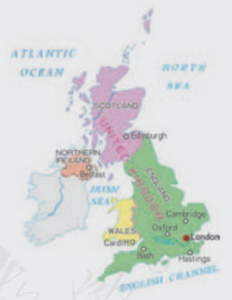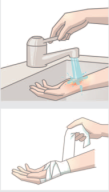1. What would the woman like to do?
| A.Live on the Silk Road. |
| B.Read about the Silk Road. |
| C.Travel along the Silk Road. |
| A.To India. | B.To Iran. | C.To Afghanistan. |
| A.The art. | B.The climate. | C.The history. |
1. Where is Adele from?
| A.Greece. | B.Germany. | C.France. |
| A.The rich history. | B.The amazing beaches. | C.The northern lights. |
| A.Co-workers. | B.Husband and wife. | C.Guide and tourist. |
| A.Heroes. | B.Festivals. | C.Countries. |
| A.A travel experience. | B.A weekend plan. | C.A favorite destination. |
| A.In spring. | B.In winter. | C.In autumn. |
With my cellphone dead, I had to ask strangers for help.
7 . WHAT’S IN A NAME?
The United Kingdom, Great Britain, Britain, England-many people are confused by what these different names mean. So what is the difference between them, if any? Getting to know a little bit about British history will help you solve this puzzle.

In the 16th century, the nearby country of Wales was joined to the Kingdom of England. Later, in the 18th century, the country Scotland was joined to create the Kingdom of Great Britain. In the 19th century, the Kingdom of Ireland was added to create the United Kingdom of Great Britain and Ireland. Finally, in the 20th century, the southern part of Ireland broke away from the UK, which resulted in the full name we have today: the United Kingdom of Great Britain and Northern Ireland. Most people just use the shortened name: “the United Kingdom” or “the UK”. People from the UK are called “British”, which means the UK is also often referred to as Britain or Great Britain.
The four countries that belong to the United Kingdom work together in some areas. They use the same flag, known as the Union Jack, as well as share the same currency and military defence. However, they also have some differences. For example, England, Wales, Scotland, and Northern Ireland all have different education systems and legal systems. They also have their own traditions, like their own national days and national dishes. And they even have their own football teams for competitions like the World Cup!
The United Kingdom has a long and interesting history to explore, which can help you understand much more about the country and its traditions. Almost everywhere you go in the UK, you will be surrounded by evidence of four different groups of people who took over at different times throughout history. The first group, the Romans, came in the first century. Some of their great achievements included building towns and roads. Next, the Anglo-Saxons arrived in the fifth century. They introduced the beginnings of the English language, and changed the way people built houses. The Vikings came in the eighth century, left behind lots of new vocabulary, and also the names of many locations across the UK. The last group were the Normans. They conquered England after the well-known Battle of Hastings in the 11th century. They had castles built all around England, and made changes to the legal system. The Normans were French, so many French words slowly entered into the English language.
There is so much more to learn about the interesting history and culture of the United Kingdom. Studying the history of the country will make your visit much more enjoyable. The capital city London is a great place to start, as it is an ancient port city that has a history dating all the way back to Roman times. There are countless historic sites to explore, and lots of museums with ancient relics from all over the UK. The UK is a fascinating mix of history and modern culture, with both new and old traditions. If you keep your eyes open, you will be surprised to find that you can see both its past and its present.
1. 读第三段并填空。| the similarities of the four countries | the differences of the four countries |
| flag known as | |
| currency | traditions: |
| military | football teams |
3. In the 19th century, which kingdom was added to create the United Kingdom of Great Britain and Ireland?
4. What were the achievements left behind Romans?
5. Which group of people made changes to the legal system? Besides this, what did they do when they came?
8 . FIRST AID FOR BURNS
The skin is an essential part of your body and is its largest organ. Your skin acts as a barrier against disease, toxins, and the sun’s rays. It also helps control your body temperature, prevents your body from losing too much water, warns you when things are too hot or cold, and gives you your sense of touch. As you can imagine, getting burnt can lead to very serious injuries. The first and most important step in the treatment of burns is giving first aid.
CAUSES OF BURNSYou can get burnt by a variety of things: hot liquids, steam, fire, radiation, the sun, electricity, acids, or other chemicals.
TYPES OF BURNSBurns are divided into three types, depending on the depth of skin damage.
● First-degree burns These affect only the top few millimetres of the skin. These burns are not serious. Examples include mild sunburn and burns caused by other minor household incidents.● Second-degree burns These go below the top layer of the skin. They are serious and take a few weeks to get better. Examples include burns caused by hot liquids.
● Third-degree burns These affect every layer of the skin, and sometimes the tissue under it. Examples include burns caused by electric shocks, burning clothes, or petrol fires. These burns cause very severe internal injuries and the victim must go to the hospital at once.
CHARACTERISTICS OF BURNS
| First-degree burns ● dry, red, and mildly swollen ● mildly painful ● turn white when pressed Second-degree burns ● red and swollen; blisters; watery surface ● extremely painful | Third-degree burns ● black and white ● swollen; the tissue underneath can often be seen ● little or no pain if nerves are damaged; may be painful around the edges of the burned area |

1 Place burns under cool running water, especially within the first ten minutes. The cool water stops the burning process and reduces the pain and swelling.
2 Dry the burnt area gently with a clean cloth.
3 Remove any clothes using scissors if necessary, unless you see the fabric sticking to the burnt skin.
4 Cover the burnt area with a loose clean cloth. Applying oil to the injured areas is a bad idea, as it will keep the heat in the wounds and may cause infection.
5 If burns are on the face, make sure the victim can still breathe.
6 If the victim is suffering from second or third-degree burns, there is an urgent need to take him/her to the hospital at once.
1. 根据文章判断下列说法的正误。(1) Your skin gives you protection from many dangerous things.
(2) A first-degree burn has this name because it is the most serious.
(3) Second-degree burns can be the most painful kind of burn.
(4) It is important to use cool water to stop the heat from remaining in the wound regardless of the degree of the burn.
(5) Putting butter or oil on burns helps because it may reduce swelling and ease discomfort.
2. 根据课文内容完成以下表格。
| Details | Types | ||
First-degree burns | Second-degree burns | Third-degree burns | |
| Depth | |||
| Characteristics | dry, red, and mildly mildly turn | red and swollen; extremely | black and white; swollen; |
| Treatment | place under | ||
I
Dear Peter,
Born into a wealthy household on December 11, 1911, Zhejiang Province, Qian Xuesen
He graduated from Shanghai Jiao Tong University and went to the United States for his further study,
He returned to his homeland in 1955 once and for all. After he returned to China, he committed



